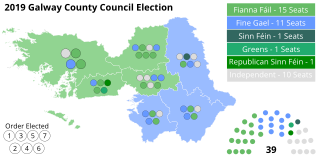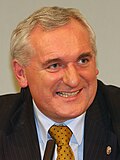
Ireland is a parliamentary, representative democratic republic and a member state of the European Union. While the head of state is the popularly elected President of Ireland, it is a largely ceremonial position, with real political power being vested in the Taoiseach, who is nominated by the Dáil and is the head of the government.
In Ireland, direct elections by universal suffrage are used for the President, the ceremonial head of state; for Dáil Éireann, the house of representatives of the Oireachtas or parliament; for the European Parliament; and for local government. All elections use proportional representation by means of the single transferable vote (PR-STV) in constituencies returning three or more members, except that the presidential election and by-elections use the single-winner analogue of STV, elsewhere called instant-runoff voting or the alternative vote. Members of Seanad Éireann, the second house of the Oireachtas, are partly nominated, partly indirectly elected, and partly elected by graduates of particular universities.
Elections in Hungary are held at two levels: general elections to elect the members of the National Assembly and local elections to elect local authorities. European Parliament elections are also held every 5 years.
Michael Brennan is an Irish former politician from Adare in County Limerick who served as a member of Seanad Éireann.

Catherine Murphy is an Irish Social Democrats politician who has been a Teachta Dála (TD) for the Kildare North constituency since the 2011 general election, and previously from 2005 to 2007. She served as founding joint leader of the Social Democrats from 2015 to 2023.
Timothy Conway is an Irish former politician from Naas in County Kildare. An accountant and long-serving local councillor, he served for six years as a senator in the 1980s and later contested two general elections. In the course of his political career he switched party twice, moving from the Labour Party to the Progressive Democrats and then to Fine Gael.

The 2009 Irish local elections were held in all the counties, cities and towns of Ireland on Friday, 5 June 2009, on the same day as the European Parliament election and two by-elections.

The 2014 Irish local elections were held in all local government areas of Ireland on Friday, 23 May 2014, on the same day as the European Parliament election and two by-elections. The poll in the Ballybay–Clones LEA on Monaghan County Council was deferred due to the death of a candidate.

An election to all 18 seats on Monaghan County Council took place on 23 May 2014 as part of the 2014 Irish local elections, a decrease from 20 seats at the 2009 election. County Monaghan was divided into three local electoral areas (LEAs) to elect councillors for a five-year term of office on the electoral system of proportional representation by means of the single transferable vote (PR-STV). In addition, the town councils of Ballybay, Carrickmacross, Castleblayney, Clones and Monaghan were abolished.

An election to all 39 seats on Galway County Council took place on 23 May 2014 as part of the 2014 Irish local elections, an increase from 30 seats at the 2009 election. County Galway was divided into 5 local electoral areas (LEAs) to elect councillors for a five-year term of office on the electoral system of proportional representation by means of the single transferable vote (PR-STV). In addition, the town councils of Ballinasloe, Loughrea and Tuam were all abolished.

An election to all 40 seats on Kildare County Council took place on 23 May 2014 as part of the 2014 Irish local elections, an increase from 25 seats from the 2009 election. County Kildare was divided into five local electoral areas (LEAs) to elect councillors for a five-year term of office on the electoral system of proportional representation by means of the single transferable vote (PR-STV). In addition, the town councils of Athy, Leixlip, Naas and Newbridge were all abolished.

An election to all 32 seats on Wicklow County Council took place on 23 May 2014 as part of the 2014 Irish local elections, an increase from 24 seats at the 2009 election. In addition, the town councils of Arklow, Bray, Greystones and Wicklow were all abolished. County Wicklow was divided into five local electoral areas (LEAs) to elect councillors for a five-year term of office on the electoral system of proportional representation by means of the single transferable vote (PR-STV).

An election to all 40 seats on Limerick City and County Council took place on 23 May 2014 as part of the 2014 Irish local elections, a reduction from an overall total of 45 seats at the previous elections and 28 at the 2009 County Council election). It was a new local authority replacing the abolished Limerick City Council and Limerick County Council. Limerick City and County was divided into 6 local electoral areas (LEAs) to elect 40 councillors for a five-year term of office on the electoral system of proportional representation by means of the single transferable vote (PR-STV).

An election to all 33 seats on Kerry County Council took place on 23 May 2014 as part of the 2014 Irish local elections, an increase from 27 seats at the 2009 election. County Kerry was divided into four local electoral areas (LEAs) to elect councillors for a five-year term of office on the electoral system of proportional representation by means of the single transferable vote (PR-STV). In addition, the town councils of Killarney, Listowel and Tralee were abolished.

An election to all 32 seats on Waterford City and County Council took place on 23 May 2014 as part of the 2014 Irish local elections. The City and County of Waterford was divided into five local electoral areas (LEAs) to elect councillors for a five-year term of office on the system of proportional representation by means of the single transferable vote (PR-STV). This was a new local authority formed as a successor to both Waterford City Council and Waterford County Council. The town councils of Dungarvan, Lismore and Tramore were also abolished.

A by-election was held in the Dáil Éireann Carlow–Kilkenny constituency in Ireland on Friday, 22 May 2015, to fill the vacancy left by the resignation of Fine Gael Teachta Dála (TD) Phil Hogan on his appointment as European Commissioner. It was held on the same day as national referendums on marriage equality and the age of eligibility for election to the office of president. The Electoral (Amendment) Act 2011 stipulates that a by-election in Ireland must be held within six months of a vacancy occurring. The by-election writ was moved in the Dáil on 29 April 2015.
The 1994 Irish local elections for borough and town councillors and commissioners were held on Thursday, 9 June 1994. The election to the urban district council in Castlebar was postponed to Saturday, 18 June 1994 due to the death of a candidate. There was no poll for Cootehill, as there were nine candidates for the nine town commissioners.

The 2019 Irish local elections were held in all local authorities in Ireland on Friday, 24 May 2019, on the same day as the 2019 European Parliament election and a referendum easing restrictions on divorce. Each local government area is divided into local electoral areas (LEAs) where three to seven councillors are elected on the electoral system of proportional representation by means of the single transferable vote.

An election to all 39 seats on Galway County Council was held on 24 May 2019 as part of the 2019 Irish local elections. County Galway was divided into 7 local electoral areas (LEAs) to elect councillors for a five-year term of office on the electoral system of proportional representation by means of the single transferable vote (PR-STV).



















